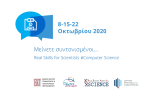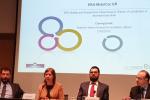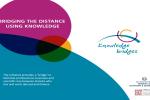
Highly-skilled human capital is very competitive in the international scientific and research environment. Actions of the National Documentation Centre (EKT) reveal the performance of the national research and innovation system and the economy. Additionally, they highlight the role that public interventions play in retaining the country’s human resources, the networking of Greek scientists in Greece and throughout the world, and documenting the mobility of doctoral students.
In attempting production restructuring, technological modernisation, digital transformation and strengthening competitiveness, support policies for human resources, especially scientists are a key element of the development strategy. To this end, EKT's actions contribute to the optimal formation of policies for the return of highly-qualified personnel and the redefinition of the domestic production model in knowledge-intensive activities.
EKT’s actions for the evaluation of public policies that finance the strengthening of the country’s Human Research Personnel have produced significant findings. Specifically, EKT's evaluation actions cover the following fields: "Support for doctoral research", "Support for postdoctoral research", "Scholarship programme for Graduate Second Cycle Studies", "Support for researchers with emphasis on young researchers", "Acquisition of academic teaching experience for young PhD scientists", under the "Operational Programme – Development of Human Resources, Education and Lifelong Learning 2014-2020" co-financed by Greece and the European Union (European Social Fund).
Based on the findings of EKT’s primary research, from a total of 2,697 grant beneficiaries, 20% returned from abroad where they had been living for the previous 5 years because of employment and studies. It is worth noting, that the actions have been inhibited the prospect of relocation for 39% of beneficiaries who sought work abroad. Beneficiaries were very positive in their evaluation of the above actions, and related research and academic activities, such as actions financed by the Hellenic Foundation for Research and Innovation (ELIDEK) to tackle the departure of highly educated human resources abroad.
In addition, EKT implements the "Knowledge and Partnership Bridges" initiative based on a plan by the General Secretariat for Strategy and Private Investment, Ministry of Economy and Development. The initiative’s goal is not only to network Greek scientists worldwide but also to connect them with the Greek economy. At the heart of the initiative is the digital platform (www.knowledgebridges.gr), through which targeted services for Greek scientists abroad are provided and dynamic ties with the country’s human resources are developed.
To date, more than 1,200 Greeks from 40 countries have registered, while there have been more than 200,000 unique visits to the platform. According to the initiative’s preliminary survey data on the needs, skills and intentions of Greek scientists living and working abroad, 58% would like to return to Greece. 70% give their main reason for returning as being the quality of life, and 42% want to be close to their families. The required conditions for their return include increased salaries (44%) and work in their field of specialisation (36%).
In response to the question of whether they intended to have any connection with Greece,an extremely high number (86%) were interested in transfering of best practices, knowledge and technology to Greece. Additionally, 84% were interested in collaborating with Greek universities and/or Research Centres and 80% were interested in collaborating on Research & Development projects. Others were interested in: having access to mobility programmes for scientists (75%), finding jobs in Greek companies/institutions/organisations (71%) and collaborating with Greek businesses to create products and/or work (70%).
It is noted that in mid-April 2019, a new practice currently being voted on in Parliament, is expected to be introduced as part of the "Knowledge and Partnership Bridges" initiative. This will reward those Greek scientists living abroad who network with the Greek economy and the research and innovation system.
Finally, a further action being implemented by EKT is the "Monitoring of the careers of new scientists after obtaining a doctorate". Through this, EKT examines the mobility of new doctorate holders by utilising the data of the National Archive of PhD Theses (www.didaktorika.gr) and correlating them with the scientific publications in international journals. Using big data analysis techniques the mobility and the geographical movement of those receiving doctorates in 2002, 2007 & 2012 (population 4,475) was examined. From the total number of scientific publications per doctorate holder, the geographical affiliation where doctorate holders were employed for each year after receiving their doctorate until 2016 was analysed and correlated.
Accurate mapping and understanding of the potential mobility of highly skilled people for all available time series is one of the main objectives of this particular action. Although the data processing is ongoing, preliminary results show there was outward mobility of those PhD students receiving their doctorate in 2002, 2007 & 2012. This trend intensified during the 2011-2014 period but has been downward in recent years.















